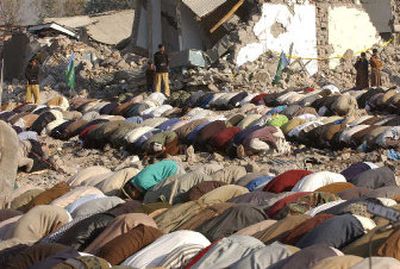Warning signs

Millennia have passed since biblical times, when every disaster seemed to be a call to repentance. But a look back at 2005 shows that some human impulses die hard.
The year’s catastrophic hurricanes, earthquakes, famines and other disasters raised choruses of prayer, not only for relief from suffering, but also for guidance to light a better moral path.
And it wasn’t just Christian conservatives who read blighted landscapes as urgent messages to give up not-so-innocent earthly pleasures – or else.
From American environmentalists concerned with global warming to Asian Muslims worried about encroachments of Western culture, many survivors of this year’s myriad disasters were quick to label them as warning signs.
“People experience (disaster) as a call to their own moral improvement, whether that means using less fossil fuel or doing less gambling or giving more donations to the poor,” says Dana Robert, director of the Center for Global Christianity and Mission at Boston University.
“Clever ministers or environmentalists will use the moment to call their people to a better way of living.”
Examples of the impulse to link disaster with morality spanned cultures, ideologies and religions in a year marked by record-setting upheaval.
For instance, one week after Hurricane Katrina decimated New Orleans and the Gulf Coast, former Vice President Al Gore connected a recent rash of hurricanes with global warming and underregulated fossil fuel usage. He told a Sierra Club meeting in San Francisco: “I would urge you to make this a moral moment, to make this a moral cause.”
Two months later, environmental lawyer Robert F. Kennedy Jr. called global warming “the greatest moral crisis of our time.”
And in December, at the United Nations Climate Change Conference in Montreal, religious activists adopted a “Spiritual Declaration on Climate Change,” which declares: “We hear the call of the Earth. … We commit ourselves to help reduce the threat of climate change through actions in our own lives.”
Across the globe in Garhi Habibullah, Pakistan, the same impulse for moral reform in nature’s wake took a decidedly different form.
Standing amid the rubble of a devastating October earthquake, 21-year-old Mohammed Ikhlaq echoed the voices of others in his town, including the imam, who took the quake as a sign from Allah to shun “Sex in the City” and other programs made possible by the arrival of cable television seven months earlier.
“We are Muslims, and we are supposed to follow our Islamic teachers, which we had abandoned,” Ikhlaq told the Los Angeles Times.
Though the moral mission framed in Pakistan looked nothing like those in post-Katrina America, the goal was the same: to let disaster spur fresh fervor for moral living, according to researcher Ronald A. Simkins.
Moral reformers “already have this kind-of dissonance with the world, saying, ‘This world is declining, there’s evil abounding,’ (and) they see such cataclysms or catastrophes as proof of their basic overall interpretation,” says Simkins, director of the Kripke Center for the Study of Religion and Society at Creighton University in Omaha, Neb.
What made 2005 remarkable, he suggests, was the degree to which it showcased how this system of thought works just as well for environmentalists as it does for some Christian fundamentalists, who saw Katrina as evidence of God’s wrathful judgment on gambling, prostitution and other sinful behaviors associated with New Orleans.
“They interpret the same events in very different ways,” Simkins says, “but ultimately there’s a similarity (in seeing) human causes of the events.”
Not all moral reformers galvanized by 2005’s disasters dared suggest a human cause for the devastation.
The Rev. Jerry Falwell, for instance, said “I don’t know” why God would allow so many disasters to occur this year. That contrasted with his comments in 2001, when he sparked a firestorm of criticism for blaming gays and liberals for beckoning God’s wrath in the form of the 9-11 terrorist attacks.
Comparative religion scholar Huston Smith insists that disasters are rightly seen as divine mysteries.
“There is no connection between morality and disaster,” says Smith, who has authored 17 books on the world’s major religions.
For instance, he asks of last year’s Asian tsunami, “Are we going to think that they deserved that? That would be atrocious.”